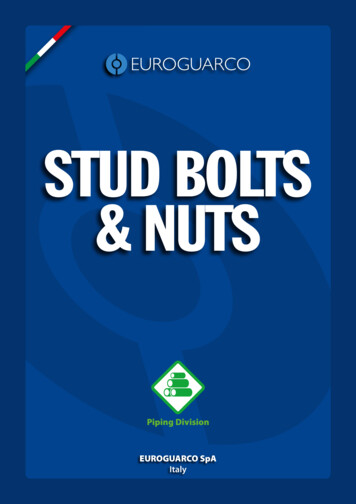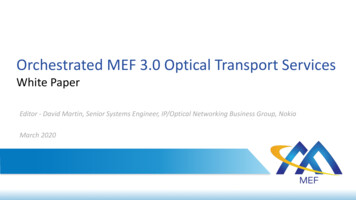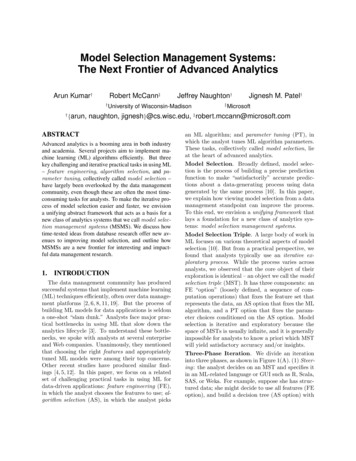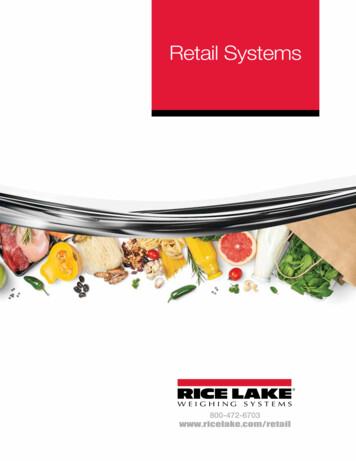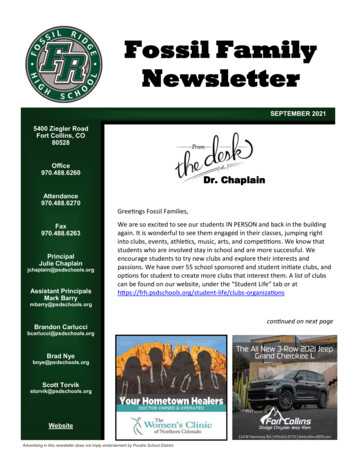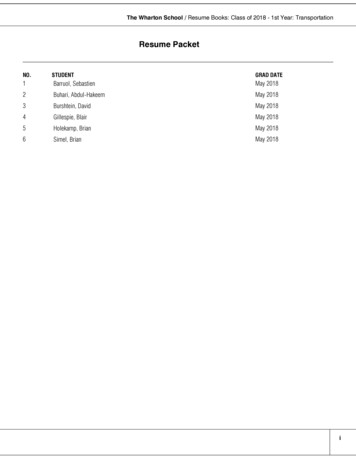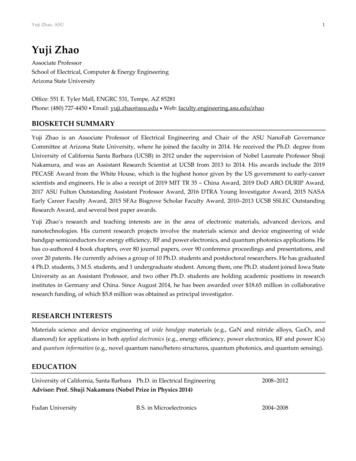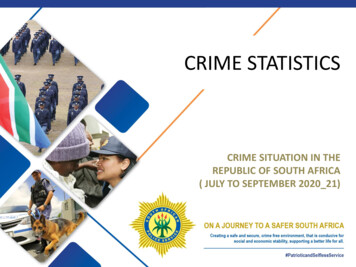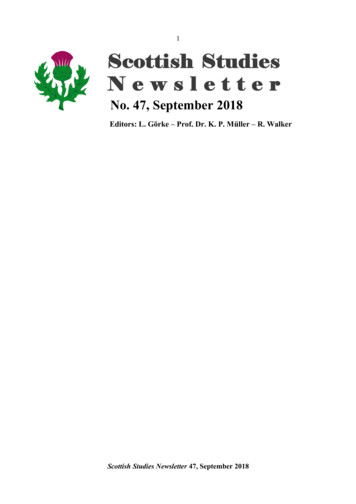
Transcription
1No. 47, September 2018Editors: L. Görke – Prof. Dr. K. P. Müller – R. WalkerScottish Studies Newsletter 47, September 2018
2Table of ContentsScottish Studies Newsletter 47, Sept 2018EditorialScotland and the Turmoil of Brexit- A. L. Kennedy, "A toxic culture"- Iain MacWhirter, "How to win Indyref 2? Keep it simple"- "Sir Ivan Rogers' letter to staff in full"Exchange students' reports- Josip Brekalo / Marco Giovanazzi,"People make Glasgow" - A report from the perspective of two exchange students- Simona Hildebrand, "Fuireach anns an Dùn Eideann – Living in Edinburgh"- Marsida Toska, "Edinburgh, my Love!"- Jessica Völkel, "Autumn in Edinburgh"3681114151618Britain after the Brexit DecisionKlaus Peter Müller, "The State of Britain 2018 - 2021: All Out War and Overall Bankruptcy"Common Weal, "Scottish National Investment Bank Success"1941New Scottish Poetry: Peter McCarey43Ian McGhee (Secretary, The John Galt Society), John Galt – Observer and RecorderStewart Whyte, Swithering Whytes or What to do with a troublesome cat?4347(New) Media on ScotlandEducation ScotlandScottish Award WinnersNew Publications March 2016 – February 2018Book ReviewsPeter Auger on Barbour's 'Bruce' and its Cultural ContextsChelsea Hartlen on Women and Violent Crime in Enlightenment ScotlandRichie McCaffery on Scotland in Europe / Europe in Scotland: James M. Morris on Facts and Inventions: Selections from the Journalism of J. BoswellKlaus Peter Müller on Sir Walter Scott. A Life in StoryCarla Sassi on Opium and Empire: The Lives and Careers of W. Jardine and J. MathesonIlka Schwittlinsky on The Space of Fiction. Voices from Scotland in a Post-Devolution .Kathrin Zickermann on Scotland in the Age of Two RevolutionsConference AnnouncementsConference Reports (2nd World Congress of Scottish Literatures,Vancouver, 21-25 June 2017, by Rhona Brown and Leith Davis)Remembering Paddy BortScottish Studies Newsletter 47, September 201849104114114135137139140142143145147149150153
3EditorialDear Readers,A warm welcome to the 47th issue of the Scottish Studies Newsletter, published in September 2018,a fairly long time after issue 46. There are many reasons for this long delay, an important one beingthe fact that there has been no development in the official Brexit proceedings. These began with thearrogant, stupid, tautological, and ultimately meaningless statement 'Brexit means Brexit' as well aswith the Brexiters' intention of having their cake and eating it. Nothing has changed there. No clearplan, no evident strategy, no transparency. These Tory politicians are both unwilling and unable tochange and to work for the benefit of the public. That public, however, the people, have changedsignificantly, most noticeably in the important shift in many English and Welsh constituencies fromLeave to Remain, and in demands to have the people's voice heard once more, and heeded, too -remain?CMP Share iOSApp Other and "2.6 million Leave voters have abandoned support forBrexit, major study finds", Independent 4-9-18 8521346.html).The current situation with its enormous dangers for Britain, Europe, the entire world and indeed our democracy are described in Peter's text 'The State of Britain 2018 - 2021: All Out Warand Overall Bankruptcy' in this issue. Solutions to the current problems must evidently bedelivered by the public. It is not enough to just express one's frustrations with politicians or toexpect improved living and working conditions from Brexit. 164 years after Charles Dickens, weagain live in very Hard Times. Dickens' world only seems to be totally different from ours, but thepower structures are still very similar: just a tiny minority control the masses. The destruction ofpeople's creativity and unhindered employment of their imagination has only increased since then;and so have – surprisingly – also the facts, the material world pointed out at the beginning ofDickens' novel with its first chapter title "The One Thing Needful" and the direct speech of MrGradgrind addressing the schoolmaster and class with "'Now, what I want is, Facts." Dickensrevealed the entire ideology connected with the relevance of facts and its disastrous results. There isan intriguing dialectic at work here today: facts have become even more important and at the sametime even more seriously denied. You thus might think that we live in a world of 'fake news', notfacts. But if you do, you have already been gulled into accepting the ideology of those trying to hidethe facts of political and economic power. You will believe Donald Trump, his admirer BorisJohnson, and the Brexiters, all of whom do not want you to find the truth, detect the significantfacts. (Just check this 2016 report on Boris's "'spontaneous' media scrum" (http://gu.com/p/4hvca?CMP Share iOSApp Other as well as the cartoons and comments there, and you'll see again thatbasically nothing has changed, definitely not with politicians.) At the same time, the digital world –which many assume is totally new and different – is also dominated by facts, and very typical facts,too. Because what are algorithms if not facts? And you all know quite a few hugely influentialcompanies (Google, Facebook etc.) but also national institutions that do not want the facts of theiralgorithms to be revealed. There is an incredible lack of transparency, a key value of democracy,urgently needed and more cunningly covered up today than in the past. People need to know thefacts that determine their lives.We have always understood the Scottish Studies Newsletter as a medium of information onmatters concerning Scotland, providing basic facts about new books, relevant news, conferences,awards, poetry etc., but also making things transparent, pointing out connections, offering insightsthat deserve particular attention and need to be revealed. This issue tries to be of that kind again andis another special issue of the Newsletter (after the one on the media), which is quite fitting for theextraordinary and difficult times we are in.Scottish Studies Newsletter 47, September 2018
4One further reason why this issue is unique is the unfortunate fact that it will be the last and final Newsletter, not only of this editorial team, but in its entire history. Peter officially retired in2016, but was asked by our faculty to continue until his successor had been appointed. With muchenthusiasm, he agreed to do this and continued until October 2017. Our department, the entire faculty, and in fact Mainz University as a whole have had a great interest in keeping the Scottish Stud ies Centre and its Newsletter alive. These Germersheim institutions have had such a long and fruitful history that this excellent tradition should indeed be preserved by all means. UnfortunatelyPeter's successor, Alison Martin, has declined to continue work on the Newsletter, as she intends todevelop her own devices. That is, of course, perfectly understandable and deserves our full support.We nevertheless regret that the successful tradition of the Newsletter, initiated by Peter's predecessor Professor Dr. Horst W. Drescher in 1984, with editions online since 1994, ends here. Wehave learned much since the beginning of our joint editorship in 2011 and have made quite a fewnew acquaintances, enhanced the strong links with the universities of Edinburgh and Glasgow, andestablished new connections with Aberdeen, Dundee, Stirling, Vancouver etc. Now is the time forothers to take over and continue this intriguing work in their own way. We wish them much successand good luck.There is another reason why this is a special issue: its focus on Britain after the Brexit Decision. Well-known people have raised their voices in this context, and you can find two very important ones here: A. L. Kennedy and Iain Macwhirter. The fact that their texts are from 2016 and2017 but still highly topical, address urgent unresolved problems and make extremely strong pointsreveals again that nothing has changed, the problems have just become bigger. Kennedy was awarded the prestigious Heinrich Heine Preis in Düsseldorf in December 2016, and her speech on thatoccasion succinctly evokes the 'Toxic Culture' in Britain, destroying the values that make humanlife worth living and humane. Kennedy is as clear-sighted and outspoken as always, and her description of the public discourse in Britain corresponds perfectly to what one finds in most mediathere: "This is a country where the public discourse is a hell's broth of gossip, malign invention, racism, rabble-rousing hatred and smut." An excellent education at home, in brilliant schools and universities is absolutely necessary for a functional democracy, she says, and who would not agreewith her? "Art is at the heart of democracy." But she also points out that "the price of freedom iseternal vigilance"!Iain Macwhirter addresses the vital issue of IndyRef2 and compares the Scottish diligence ofthe Independence White Paper Scotland's Future, produced by the SNP government in 2013 beforethe 2014 referendum on Scottish independence, with the carelessness of the Leave campaign's arguments during the 2016 Brexit referendum, arguments consisting of simple slogans and outright lies.He reveals how Scotland has been lied to even more than the people in Wales and England, howmuch more urgent Scottish independence now is, and that "The next referendum will be about LittleEngland, not Europe." He is also as outspoken as A. L. Kennedy: "If Scotland stays in the UK itwill be hitching itself to a post-imperial Brexitania run by bandit capitalists who still think they'reliving in the days of the British Empire." Sounds harsh, but is as true as what Kennedy says in hertext and corresponds perfectly with the Brexit reality.Scots who want to be independent or just have more rights and a greater autonomy indeed "seetheir nation reduced to the status of a backward region – the UK equivalent of Belarus or East Germany" (Macwhirter) by the right-wing, neo-liberal Westminster government and its supporters inbusiness and the media. So let Britain go, one could simply say, improve the EU, stop neo-feudaland neo-liberal tendencies in it, and end up with an independent Scotland in the same process. England would thus eventually learn that it is part of Europe after all and that its special relationshipwith the US was already lost after WWII. This would be a very difficult learning process for England, but definitely better than keeping Scotland tied to a government it has not voted for and thatScottish Studies Newsletter 47, September 2018
5completely disregards the will of at least half of its own population and the majority of Scots. Thestatement in our last editorial "it seems that the real period of uncertainty is about to begin" hasturned out to be completely true. We still do not know what Brexit will actually look like, nor whatwill happen after March 2019, and when Scotland will at last be independent. Uncertainty is, ofcourse, an essential characteristic of life, as change is inevitable, a perennial process, simply part ofconstant evolution. It is, however, never sure that life will eventually improve. That requires activehuman participation in trying to bring improvements about, the vigilance and thoughtful activityKennedy and Macwhirter call for and which we, too, support.Our students Josip Brekalo / Marco Giovanazzi, Simona Hildebrand, Marsida Toska, and Jessica Völkel have been active, visited Scottish universities, increased their knowledge and experience in this way and reported about this in their texts. Involving students in the production of theNewsletter has been a constant endeavour of ours, as writing texts will be an important part of theirfuture lives.The fact that there are eight reviews in this issue is a strong indication of the excellent work byRon, who has taken care of this section as well as of poetry, conference announcements, andawards. The range of books and their various topics, discussed by Peter Auger (on Barbour's'Bruce'), Chelsea Hartlen (on Women and Violent Crime), Richie McCaffery (on Scotland inEurope / Europe in Scotland), James M. Morris (on Facts and Inventions in Boswell's journalism),Peter (on Walter Scott), Carla Sassi (on Opium and Empire), Ilka Schwittlinsky (on The Space ofFiction), and Kathrin Zickermann (on Scotland in the Age of Two Revolutions), are once more intriguing examples of the diversity we have intended to offer our readers. Diversity and multiple perspectives on the same events are also an essential idea behind the two reports on the Second WorldCongress of Scottish Literatures in Vancouver in June 2017, respectively written by Leith Davis,the organiser, and Rhona Brown, both a participant and the Secretary of the International Association for the Study of Scottish Literatures (IASSL).We are glad to have Peter McCarey as the representative of new Scottish poetry in this edition.Find out whether you'll agree with the characterisation his work has received as "contrary, generous, intermittently barmy, always readable", or give it your own characteristics. Ron's cooperationwith poets and poetry associations has been remarkable, while Lothar has above all supplied us withhis technical know-how in getting the Newsletter into print and on to the web.Those who have been following the growing revival of interest in John Galt in recent years, orwho would like to find out more about the writer and the work of the John Galt Society, can turn tothe article by Society secretary John McGhee in this issue. Stewart Whyte's piece, 'SwitheringWhytes', on the work and legacy of his father, the writer, journalist and pioneer of BBC Scotlandchildren's broadcasting, Don Whyte, may well also help inspire a revival of interest in another Scottish writer who deserves to be better known.Paddy Bort died in 2016, and he is commemorated here as a German who worked at the University of Edinburgh and was a constant advocate of cultural exchange between Scotland, Germany,and Europe in various areas, especially politics, music, literature. He will be sorely missed in all ofhis different communities.People die, publications end, like most other things. Whether the universe is endless, we stilldon't know. But we do know that human beings must never give up trying to improve the humancondition. The endless need to continue human efforts to improve life and to enhance intelligentcommunication between all cultures has repeatedly been expressed in the Scottish Studies Newsletter and is evident in this edition once again. So let's finish by thanking you for your support, andlet's continue our common efforts to improve humankind as well as Scottish and European relations.The Editors: Lothar Görke –Klaus Peter Müller – Ron Walker - Germersheim, August 2018Scottish Studies Newsletter 47, September 2018
6Scotland and the Turmoil of BrexitA Toxic CultureA. L. KennedyAL Kennedy was awarded the Heine Prize in Dusseldorf, Germany [in December 2016]. Theprize is “to personalities who serve by their intellectual heritage in terms of fundamental humanrights, for which Heinrich Heine used to promote social and political progress, international understanding or the realization of the unity of people”. The Heine Prize jury said: “The HeinrichHeine Prize of the City of Dusseldorf 2016 is awarded to the excellent AL Kennedy, well known forher idiosyncratic literary work, which plumbs the limits of the human soul. Her views on politicaland social conditions sharpen social discussions about the Iraq war and the proposed referendumon the United Kingdom's membership of the European Union in the tradition of Heinrich Heine. ALKennedy is a great literary figure and European”. This is her acceptance speech.I would like to thank the judges of the Heine Preis for allowing me to receive this honour, to bethought of as a good writer by people of intellectual rigour and good judgment is always a kind surprise. To be thought of as in any way worthy of a prize which also seeks to celebrate the promise ofhumanity and the role of writing within the ongoing project which is human civilisation is verymoving. To be associated with the spirit of Heine's writing, his compassion, his imagination, hisdaring, his mourning and his outrage – this is beyond what I would have hoped for myself, or mywork.So thank you all.But, as you know, the arts today cannot simply be about maybe some happy press releases anda congenial event where we congratulate each other on knowing about values. We are all aware thatthe values which keep us all safe, promise us the best possible opportunities to fulfil our humanityand to see and cherish what is human in others – those values are currently being forgotten, derided,or quietly buried alive.As Germany clings to the lessons it learned about cultural toxicity long ago, I speak to you as acitizen of the UK, a country where books do not have to be burned – epidemic library closures and amassively compressed literary culture quietly prevent books ever being read or even born. Mine is acountry which would rather leave traumatised and undefended children in the Calais mud, or nowwho knows where, than offer them the welcome we once extended to the kinder transports and to100's of thousands of refugees before and after World War II. This is a country where the availability of the arts has narrowed shockingly in the last decades and where community arts are especiallyunder threat. This is a country – a wealthy country – where around 130,000 of our own children arehomeless.This is a country which tortures in black sites abroad and police stations at home, which incarcerates citizens without trial. This is a country with a wrecked education system for the massesbased on monetisation and testing and an emotionally traumatising and entitling education for theelite. This is a country where there is less and less mass media arts coverage. This is a countrywhere the public discourse is a hell's broth of gossip, malign invention, racism, rabble-rousinghatred and smut. This is a country where civil servants despair, where politicians base decisions onfaith and feeling which does not include faith in our species or fellow feeling, where any attempt torise above the gutter is reframed as smugness, or otherworldly insanity. This is a country where – asthe UN recently pointed out, our government's treatment of the disabled contravenes their humanrights and where there is no need for an equivalent of Aktion T4 to organise the extinction of humanbeings with disabilities. We have simply withdrawn all their means of support, subjected them toofficial harassment and mass-media demonisation and waited for them to die in their tens of thouScottish Studies Newsletter 47, September 2018
7sands – of stress, starvation, or else driven to suicide by their pain and despair. Make no mistake;we have been lost for some time – long before Brexit advertised that fact to the world. There is nomorning when I could not wake up and say, like Max Liebermann – who once illustrated an editionof Der Rabbi Von Bacherach – “Ich kann gar nicht soviel fressen, wie ich kotzen mochte.” [There'sno way I could eat enough to vomit as much as I would like to.']And this lack of art and this lack of humanity – they are connected. You know it, I know it, wehave known it all along, but we have allowed the dominant discourse to forget. But as FranklinDelano Roosevelt said, “Democracy cannot succeed unless those who express their choice are prepared to choose wisely. The real safeguard of democracy, therefore, is education.”The practice of arts, contact with the arts, is our lifelong education – right here – it prepares usto choose wisely. It exercises our imagination, the force that allows us to visualise any change, allconsequences, to empathise with each other. Without it, hope is a form of delusion. Art is at theheart of democracy. If we doubt ourselves, if we feel we may simply be making ourselves feel important because we are artists, then we can look to science, we can read about situation pressure andits massive power – what is culture but situational pressure. We can read about empathy, aboutcompassion – how to diminish it and how to enlarge it – by doing what art does. We can study history, we can learn all over again the beautiful and terrible truth of Heine's words from the play Almansor, “Das war ein Vorspiel nur, dort wo man Bücher verbrennt, verbrennt man am Ende auchMenschen” [That was just a prelude, where books are burnt, people will eventually burn too].We can look at the work of Raphael Lemkin, the man who invented the term Genocide beforethat crime had a name and who studied many culture's progressions into genocide – and see that theVorspiel is always the same – first the art is murdered, then the people. Always. Always.And speaking now for myself – I'm 51 years old and my life as a writer has failed. For something like 35 years I have produced work and I have loved the process of that and I have earned myliving – I have been paid to dream aloud, there could be no better life for me – and I have a nicehome and I've won some prizes and I have – from time to time – worked with writers in prisons, orcommunity centres, or hospitals, worked with new writers, with children, written in the media – andI have learned from that, but I haven't talked enough about what I have learned. I have seen art lightup lives, because that is what art does. But I haven't done enough. I haven't told enough people howprecious that is, I haven't fought to make a space within which that could be heard. Like many of us,perhaps, in comfortable, apparently stable democracies I have forgotten that the price of freedom iseternal vigilance and I have mistaken lazy silence, cowardice, for truly loving tolerance. Love tellsthe whole truth – when something is wrong there is no love in being silent and nodding as if it wereright. And I haven't said – at the start of every workshop – we will now make a part of culture – thething which tells us to be cruel or to be kind, alone or united, ignorant and frightened, or endlesslylearning and brave. And this matters – always – so we will now break our hearts to be extraordinarybecause anything else, anything imperfect, anything simply self-obsessed, weak and “conceptual”diminishes the place of art amongst us, wastes perhaps the only chance that art will have to improveand awaken and even save a life. This is life and death.Whenever we see reality TV shows that diminish humanity, articles that lie in a way fictionwouldn't dare to, words used to rob them of their sense, or cynical website pieces that feed off outrage, while creating more, I haven't said often enough – There cannot ever be a place for thisamongst us. It is not elitist to want the best for our fellow-man – it is insulting to stand by whileother human beings are fed manure, are shown, over and over, only how low humanity can go. Itcannot be that only our cars and electrical goods are aspirational. It must be that our dramas, or novels, songs, photographs, paintings, cartoons, poems, ballets, operas and all the rest are extraordin-Scottish Studies Newsletter 47, September 2018
8ary, diverse, unexpected and things of life. If we have no money, then we have no money – art canbe cheap without being bad, toxic, hateful. This is a necessary truth.And I owe my career, my artisan's satisfaction and any morality I might lay claim to as a person to art, to writing, to – for example – a single scene in a drama that haunted me in my childhoodand has ever since. In the drama a man who was not a torturer, but who was weak, stood in a torturechamber and was handed a pair of pliers – and there was the torture victim and there was the torturer and there were the pliers and there was the unspoken assurance that if the weak man did nottorture he would be tortured and there was the pause. And that drama, by German screenwriter Lukas Heller who was born in Kiel in 1930 – asked me and still asks me – and what would you do?How weak are you? How best can you control your weakness and your desire for self-preservation– how do you prevent your fall and keep yourself and others truly safe?And the how is what art always tells us – amongst everything else that it shows us and tells us.And it makes me think of lines from Heine's poem – Allnächtlich im Traume – which is largeenough to be about more than one kind of love Du sagst mir heimlich ein leises Wort,Und gibst mir den Strauß von Zypressen.Ich wache auf, und der Strauß ist fort,Und das Wort hab ich vergessen.You say to me secretly a soft word,and give me a garland of cypress.I wake up, and the garland is gone,and the word I have forgotten.As writers and artists we keep hold of the cypress that reminds us we all die and that we should bemerciful and we serve the dreams that come to us to be expressed. We make them articulate and letthem join the larger dreams that others make for us, the dreams that form our culture. Our culturemakes the reality we inhabit. As artists, as writers, we are paid to dream awake and that is very nicefor us. As human beings, which is more important, we have a duty never to forget those secretwords we hear in darkness and to guard each other from the worst of who we can be, the worst ofworlds that we can make and to do better. And we can love that, we can love that loudly. I wouldthank Heine and the Heine Preis for being part of what I love.(Reprinted with the permission of A. L. Kennedy. This text is also available with readers' commentsat lture/.There is information on the Heinrich-Heine-Preis, the people in the jury, their reasons for choosingKennedy, etc. here teilung/pld/heine-preis-fuera-l-kennedy.html), and this is a text on how Kennedy's pertinent speech was received in Düsseldorfwith a thoughtful, intelligent comment on the occasion (Rheinische Post 12-12-16 vorkulturverlust-aid-1.6457940).How to win Indyref 2? Keep it simple.Iain MacwhirterCIVIL servants in the Scottish Office have reportedly been put to work preparing for the next independence referendum. If so, what should they be urged to do? Actually, not very much.If Nicola Sturgeon is going to push the button on indyref 2 she should learn from the Brexiteers. They didn't produce a 670-page White Paper, as the Scottish Government did in 2013, whichraised more questions than it answered. They didn't produce anything at all, just anecdotes aboutbent bananas and a droning dog whistle about immigration.Scottish Studies Newsletter 47, September 2018
9The Leave campaign demonstrated that it is possible to win a referendum without experts – asMichael Gove said, Britain has had enough of them. Indeed, they managed to win the EU referendum without having the foggiest idea of how Britain could leave the wealthiest and most comprehensive free trade zone on the planet, the European Single Market, and still, somehow, have freeand unfettered access to it. Six months after the referendum, they still haven't.I'm not saying that the Scottish Government should emulate the post-truth of the Brexiteers.Even the American Alt Right would have been ashamed of Leave's red bus claim that the NHSwould be 350m a week better off out of Europe. But it was largely irrelevant because no-one believes anyone's statistics any more. The 2013 Independence White Paper, "Scotland's Future”, was acreditable attempt to address the complexities, and it avoided alternative facts – but there is no needto repeat it.The next Yes campaign should play smart and remain studiously vague about life after independence. The precise nature of Scotland's relationship to the EU and the UK is a post-independence issue because we don't yet know the precise terms of Brexit – only that it will be hard. Aboutthe only thing that can be said with any certainty is that, whatever happens, there needn't be a hardborder between Scotland and England, because everyone is agreed that it isn't going to be onebetween the Republic and Northern Ireland.There may be economic disturbance from Scotland leaving the UK, but it will be as nothingcompared to the turbulence from the UK leaving the EU. All the cards are in the air now, and noone knows where any of them will come down. All we know is that the most successful countries inthe world are small, dynamic, social democratic – and part of the EU. As Mark Littlewood of theIEA put it on Question Time, Scotland has the GDP of Portugal and the population of Slovakia, sothere's no reason on earth why it couldn't be independent.We don't know if it is going to be a WTO Brexit, a Commonwealth Brexit, a free trade Brexitor a Trump Brexit. So the Yes campaign should avoid premature debate about whether Scotlandshould join the European Free Trade Area, the European Economic Area or the Customs Union.Just stick to the EU, or better still, "Europe". We don't yet know how Scotland's accession to the EUwill work – only that it will.Nor should Yes 2 resort to monetary metaphysics that no-one will understand. Scottish pound,currency union, euro, bitcoin or whatever – it all depends on the circumstances that exist at the time,and these are imponderable. So much is in flux with the UK preparing for tariff and currency warswith the EU. Scotland doesn't have a dog in that fight. Sturgeon should just say that a future Scot tish government will ensure that, yes, there will be a currency.The lesson of Brexit is that independence is essentially about sovereignty. You don't have todot all the i's, just find a form of w
Scottish Studies Newsletter 47, September 2018. 2 Table of Contents Scottish Studies Newsletter . 21-25 June 2017, by Rhona Brown and Leith Davis) Remembering Paddy Bort 153 Scottish Studies Newsletter 47, September . Stirling, Vancouver etc. Now is the time for others to take over and continue this intriguing work in their own way. We wish .

